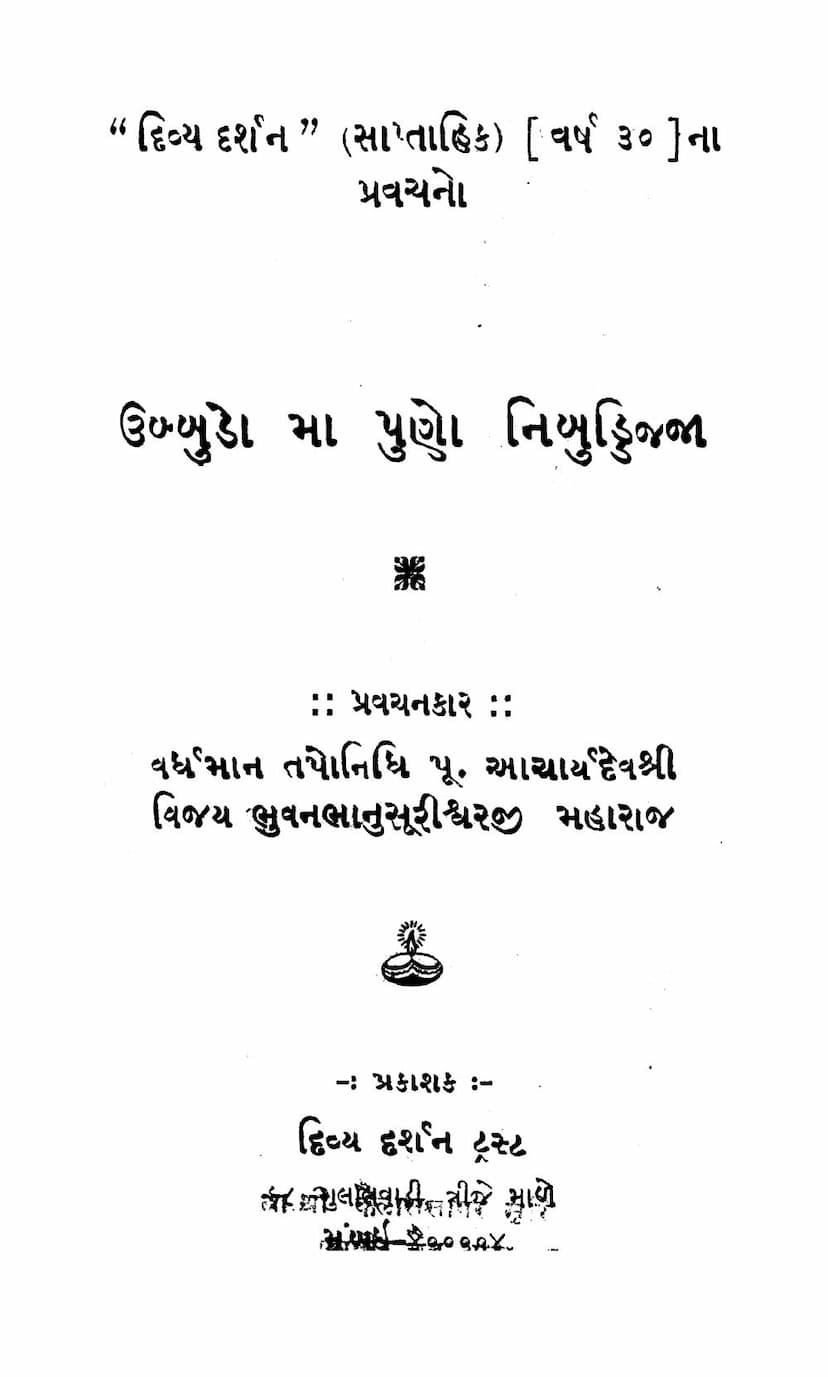Ubbudo Ma Puno Nibuddijja
Added to library: September 2, 2025

Summary
The Jain text "Ubbudo Ma Puno Nibuddijja" by Bhuvanbhanusuri, published by Divya Darshan Trust, serves as a spiritual guide for Jains, particularly emphasizing the importance of righteous conduct and spiritual discipline to escape the cycle of rebirth. The title, translating to "Having risen, do not sink again," encapsulates the central theme of the text, which draws upon the teachings of Shrutakevali Shri Bhadrabahuswami and the Avashyak Niryukti Shastra.
Key Concepts and Themes:
- The Human Birth as a Precious Opportunity: The text likens the human birth to being at the surface of the ocean, a state of relative elevation. It warns against falling back into the lower realms of existence (like animals or plants) which are described as being submerged deep within the ocean of worldly existence.
- The Danger of Knowledge Without Action: A central warning is that mere intellectual knowledge ("subhupi janata" - knowing a lot) is insufficient if not accompanied by righteous conduct and spiritual practice ("charan-karan-vihino" - without conduct). It compares this to knowing how to swim but not practicing it, leading to drowning.
- The Importance of "Charan" and "Karan": "Charan" refers to the fundamental virtues and vows (like Ahimsa, Satya, Brahmacharya, Aparigraha), and "Karan" refers to the subsequent observances and practices that support these vows (like adherence to Jain rituals, service to elders, etc.). Both are crucial for spiritual progress.
- The Difficulty of Virtue, The Ease of Vice: The text highlights that good deeds, spiritual practices, and self-improvement are difficult, while vices, laziness, and indulgence are easy. The human life is precious precisely because it offers the opportunity to undertake these difficult, yet rewarding, spiritual efforts.
- The Power of Righteous Conduct: Through various examples, the text illustrates how righteous actions, even seemingly small ones, performed with the right intention and diligence, lead to significant spiritual merit and positive outcomes. Conversely, neglecting dharma leads to downfall.
- The Role of Renunciation and Detachment: The examples of figures like Bharat Chakravarti and Bahubali demonstrate the elevated state achieved through renunciation and detachment from worldly pleasures and possessions.
- The Importance of Inner Transformation: The text stresses that true spiritual progress comes from inner transformation, cultivating virtues like compassion, forgiveness, and equanimity, rather than mere outward rituals.
- The "Marm" (Essence) of Dharma: The text delves into the essence of Dharma, explaining that it lies not just in performing actions but in cultivating the right inner attitude and intention. This includes understanding the impermanence of worldly things and the dire consequences of attachment.
- The "Jayan" (Carefulness/Vigilance) in Practice: It emphasizes the need for constant vigilance and carefulness in observing religious practices to avoid falling back into sinful tendencies or breaking vows. This includes avoiding situations and company that might lead to spiritual compromise.
- The "Sangrah" (Collection) of Virtues: The text encourages the diligent cultivation of virtues and the avoidance of vices. It highlights the importance of positive mental states, such as gratitude, reverence, and detachment, in spiritual growth.
- The Power of Faith and Devotion: The text underscores the transformative power of unwavering faith in the teachings of the Jinas, the guidance of enlightened Gurus, and the practice of devotion, exemplified by the story of the monkey who attained heaven through sincere devotion.
- The Significance of Renouncing Worldly Desires: The text consistently advocates for detachment from worldly possessions, pleasures, and relationships, seeing them as hindrances to spiritual liberation. It emphasizes that true happiness lies in spiritual advancement, not material accumulation.
- The Path to Liberation: Ultimately, the text guides readers toward understanding that the human life is a stepping stone to liberation (moksha). This is achieved by diligently following the path of dharma, cultivating inner purity, and renouncing worldly attachments through consistent spiritual effort and vigilance.
In essence, "Ubbudo Ma Puno Nibuddijja" serves as a profound reminder of the preciousness of human life and the responsibility it entails. It urges individuals to actively engage in spiritual practices, cultivate virtuous qualities, and maintain constant vigilance to avoid falling back into lower states of existence, thereby progressing towards the ultimate goal of liberation.